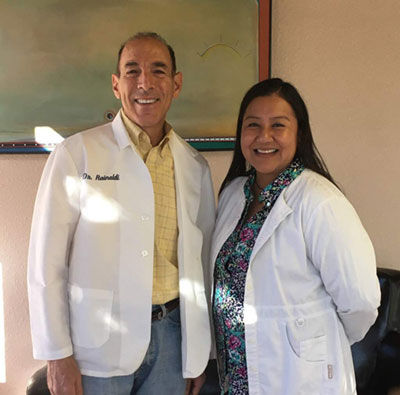Still living the ATSU mission: DezBaa Damon-Mallette
Posted: January 18, 2019
DezBaa Damon-Mallette, DMD, ’07, alumna of A.T. Still University’s Arizona School of Dentistry and Oral Health (ATSU-ASDOH), tells us about her journey to a career in dental medicine in her own words.
Q: What did you study at ATSU?
A: I attended dental school at ATSU-ASDOH. I completed my undergraduate degree at Arizona State University.
Q: Tell me about your career. What are you doing now?
A: I started work in Bethel, Alaska for four years, working at Yukon-Kuskokwim Health Corporation as a general dentist. I then moved to Arizona and worked at Sage Memorial Hospital/Dental office for about two years. My husband and I then moved to Albuquerque, New Mexico and I worked for about two years at Community Dental Services, Inc., a non-profit community-based dental office. In the spring of 2016 I made a switch to private practice at small office in Rio Rancho, New Mexico. My husband graduated in May 2017 and we made a move to Gallup, New Mexico. I am now working as an Associate General Dentist with Lidio Rainaldi, DDS, in a private office in Gallup, New Mexico.
Q: What attracted you to ATSU?
A: I feel that the University focuses on community outreach and the programs not only prepare us for the health career of our choice but the professors show us how to provide healthcare that encompasses the patient’s overall health needs. We are celebrated when we are able to treat each patient with compassion and understanding.
Q: How have you served the underserved in your work?
A: My primary goal as a dentist is to provide quality care to patients that may not always have access to such care. Working in Bethel, Alaska and Ganado, Arizona, I was able to provide care to people of my American Indian heritage. Many of these people were traumatized in the past by dentists that were just “trying to get the job done.” There was no compassion and attention to the patient’s overall well-being. In Albuquerque, I was exposed to patients who were struggling with drug abuse and it was an experience getting them back to oral health. These patients were so appreciative and often were emotional as they made their journey back to health. Where I am at currently is near the Navajo Reservation, so I am able to see people of my community again which is so rewarding.
Q: How did your education at ATSU prepare/inspire you to work with the underserved?
A: At ATSU-ASDOH, we were involved in community outreach projects and our professors often were also involved. The biggest impact at school for me was working in the special needs clinic. I was always so humbled working with a special needs patient, their struggles were an eye opener for me and it taught me to be patient and more open-minded.
Q: What are you most proud of in your work?
A: I am so proud to have the skills and knowledge to give people back their smiles. An example is of a Yupik Alaskan Native woman in her 50s. I was able to extract this woman’s bad teeth and provide her with dentures. She always remembered her teeth being sharp, black, and chipping. She also had sores from time to time due to the cavities. She also had been afraid to go to the dentist, but I was able to make her feel comfortable and we were able to extract the teeth because they were not restorable. We then got started on her dentures and when the day came to give her the dentures she looked in the mirror and had tears. She could not remember the last time she saw her teeth being in a healthy state. She later surprised me with a Kuspuk (a hooded over-shirt) that she made herself with a butterfly on the front. I still have the Kuspuk today and wear it with pride.
Q: What are your goals for the future?
A: I am currently at a private office, but my goals are to still be of service to my community, which includes all ethnic backgrounds, but a larger percentage are American Indian. I want to be an example to the youth and I also would like to be able to provide dental treatment that American Indian patients cannot always get with the Indian Health Service, like dental implants. As I gain my footing in Gallup I will continue to think of ways to be of assistance to the youth as they pursue various health careers. I do my best to be very approachable to the youth, I want them to feel comfortable coming to me for any questions about education and health careers.
Q: What advice would you give someone who wants to pursue a career in healthcare?
A: I would recommend they shadow a healthcare provider to see if that particular field is of interest to them. Also, it is not a bad idea to go online and see how many job opportunities are available for that field. Know for sure if you like working with people. Once you definitely know that you want a career in healthcare, be persistent in obtaining your goals. Do not give up.